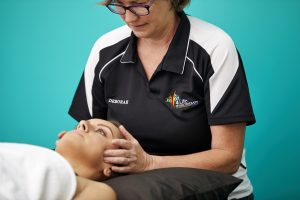Paediatric Physiotherapy
It is hard for us to see our children struggling or in pain so we are here to take the stress away! Physiotherapists are movement experts and can assess the bio-mechanics, function and development of gross motor skills in your little ones. Gross motor skill development begins as soon as your baby is born as they learn how to turn and lift their head and discover their hands and feet. It progresses to them being able to roll, sit, crawl and eventually walk. Toddlers work towards running, jumping, hopping, skipping and climbing stairs while young children refine their skills and become able to perform them at speed and combine multiple movements together.

There are many different things that can cause our little ones to not achieve these skills yet. This can range from not being exposed to movement opportunities and environmental challenges (e.g., not being able to climb stairs because they have never encountered stairs) to neurological conditions (such as cerebral palsy and muscular dystrophy). It is important to remember that every child is an individual and will progress on their own timeline. A physiotherapist will be able to assess your child’s skills and determine if they are on track considering all their individual traits.
Pain is a common reason people bring their children to see a physiotherapist. It can be tricky to know if your child is in pain, especially if they have difficulty communicating. Some signs that children might be in pain include obvious things like crying, holding a body part or limping, but can also be more subtle such as a change in behaviour, difficulty settling, frowning/pained facial expressions or changes in sleep patterns. Physiotherapists assess and manage pain by determining the source of the pain and helping treat it or referring when necessary.
What can you expect from your child’s physiotherapy appointment?
The initial assessment will begin with gaining a thorough history of what you are concerned about with your little one and may include questions regarding the birth of bub, development etc. We like to ask parents/caregivers and the child (where possible) as this gives us the best picture of where your child is at. There will be different assessments during the session so the physiotherapist can determine what is contributing to the issues you have raised. Assessments may include looking at their posture, how they move/walk/run and mobility/strength. The physiotherapist will then work with the child and caregivers to create a plan that meets your goals. All assessments and treatments are current and evidence-based to ensure quality care.

Ways physiotherapists can help young children:
- Help them develop gross motor skills
- Improve mobility, strength, power, endurance, gait/running mechanics, balance and coordination by providing exercises tailored for your child
- Treatment after an acute injury such as falls or sporting injuries
- Assist with management of neurological/developmental disorders and persistent pain
- Provide pain relief through hands-on therapies and help create self-management strategies
- Pre/post-surgery rehabilitation
It is really important that physiotherapy is fun for your child! We want it to be a positive experience for all involved and we try to make every interaction with your children as fun as can be! Often, we have to ask your child to do some kind of exercises at home, so we make them related to what your child is interested in and engaged to participate in.
Is it challenging being a parent, let alone with the added stress of worrying about your child’s pain or development so book in today with our Physiotherapist Lauren Jones who will be able to assist you and your child to help put your mind at ease.






